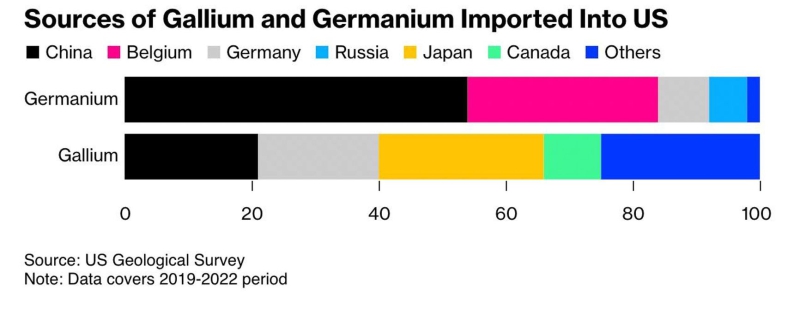China has imposed restrictions on the supply of the rare metals gallium and germanium, which the U.S. needs for microelectronics manufacturing. The step was a response to Washington’s efforts to slow down China’s microelectronics industry. The American ban on transferring the latest generation of cutting-edge technology and microchips to China has left the latter several years behind in artificial intelligence. This applies, among other things, to AI technologies used for military purposes. Meanwhile, China controls more than 80% of the world’s germanium, and the U.S. government’s strategic gallium reserves are coming to an end. Arndt Uhlendorf, an expert at the Swiss Institute for Rare Earths and Metals, believes that the market will find a way to supply the American economy with gallium and germanium — and that the resulting profits will flow into the pockets of the same intermediaries who are helping Russia export its own metals in circumvention of Western sanctions.
New bans on exports of strategic materials
China has imposed strict export restrictions on gallium, germanium, and antimony, along with superhard materials that are used in high-tech and defense applications. Graphite shipments have also come under scrutiny. The actions came in response to the toughening of U.S. sanctions against Chinese industries, Bloomberg reported.
Arndt Uhlendorf, head of the Swiss Institute for Rare Earths and Metals, explained to The Insider that China's bans would not lead to a complete halt in U.S.-bound shipments. Uhlendorf noted that, as with aluminum, copper, and nickel from Russia, the materials could come through intermediaries:
“Since the imposition of sanctions, Dubai, Istanbul, Mumbai, and Doha have become major players in the market for these metals. Apparently, these metals somehow find their way to these destinations from Russia, and from there, they find happy customers all around the world, and no one cares about their origin or sanctions. Similar pathways are likely to emerge for gallium and germanium from China.”
China's strategic resources
China is a world leader in the production of strategically important materials, including gallium and germanium. The country provides 98% of the world market’s primary gallium and over 80% of its germanium. These materials are indispensable in the production of semiconductors, satellites, optical devices, and night vision systems.
Alastair Neal, an expert in raw materials and China from the Critical Minerals Institute, notes that the U.S. has a certain volume of germanium in its strategic reserves, but no gallium. The small size of the gallium market (about $100 million per year) is holding back investment in the development of alternative sources. According to the United States Geological Survey, Germany, Japan, Canada, and some Latin American countries also possess gallium deposits, but their development is costly and time-consuming.

Economic implications for the U.S.
After the tightening of restrictions, China practically halted its exports of gallium and germanium to the U.S., triggering a price surge: 80% for gallium and an astonishing 100% for germanium.
The U.S. Geological Survey estimates that a complete ban on exports of these materials could cost the U.S. economy $3.4 billion. Washington is looking for ways to diversify its supply chains, but a quick solution seems unlikely.
The escalating technology war
The Insider previously wrote that the U.S. seeks to contain China's technological progress and outpace it in state-of-the-art technology and AI. Washington fears that China's military could outperform the United States Armed Forces precisely because of semiconductors. According to the U.S. Department of Defense's annual report, the Chinese PLA is “pursuing next-generation combat capabilities based on its vision of future conflict, which it calls ‘intelligentized warfare,’ defined by the expanded use of AI and other advanced technologies at every level of warfare.” In this endeavor, Beijing is guided by Made in China 2025 — a strategy for the development of manufacturing industries.
However, while China is leading the way in some AI applications, such as facial recognition, its industry is not yet autonomous when it comes to the most advanced technologies. Its businesses rely on imports, and the U.S. wants to curb that option.
Development in AI depends on having access to the latest chips, and the Russian International Affairs Council cites the development of artificial intelligence as one of the key areas of strategic competition between the U.S. and China. Meanwhile, the Russian government has invested $1 billion to create a chip-manufacturing technology chain of its own.
Former Google CEO Eric Schmidt said in a recent interview that China is years behind the U.S. in AI, in part because of a shortage of microchips caused by restrictions imposed by the Trump and Biden administrations. Specifically, this applies to the latest Nvidia microchips.
“In the case of artificial intelligence, we are well ahead, probably two or three years ahead of China, which in my world is an eternity,” Schmidt said.
Gallium: a key element of future technology
Gallium is used in semiconductor technology. Semiconductors based on gallium compounds have higher switching speeds and generate less noise thanks to the peculiarities of their electronic band structure. The semiconductor gallium arsenide (a compound of gallium and arsenic) has a number of advantages in this regard and, despite its higher cost, is replacing silicon in high-performance chips. Apparently, without gallium arsenide semiconductors, 5G data transmission would be impossible due to speed requirements.
Gallium has also found application in super strong magnets (such as those used in wind turbines), silicon-based solar cells (as an alloying additive), and in liquid crystal displays. In the future, fusible gallium could be widely used as the basis for “liquid wires.”
China's control over gallium production poses significant risks to global supply chains. Until other countries ramp up gallium production, the global economy will remain vulnerable to any Chinese restrictions.
Increased sanctions pressure
The U.S. has added 140 Chinese companies to its sanctions list, tightening controls on the supply of advanced technology. In response, Chinese associations were warned to exert caution when using U.S. designs.
The technology war between Washington and Beijing is entering a new phase. Experts believe that an escalation in this conflict could lead to significant economic losses on both sides and the transformation of global supply chains.

